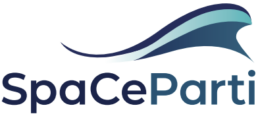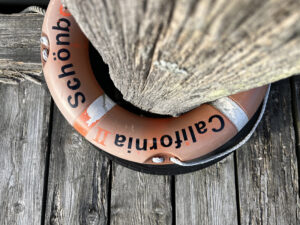
Latest NEWS
Latest NEWS
Sea Ranger pilot project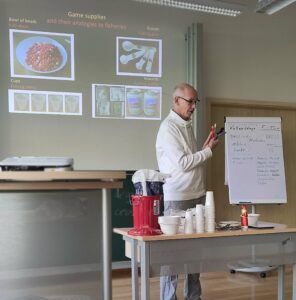
A sustainable idea for adapting the fishing profession in the western Baltic Sea to current circumstances (overfishing, climate change, biodiversity loss/change) comes from the Wismar Bay fishing cooperative. For this purpose, the Sea Ranger concept was devised, which SpaCeParti is supporting and helping to shape. The aim is to diversify the fishing profession and to take on tasks in nature conservation, public relations and ecosystem management in cooperation with authorities and research. 11 fishermen are currently taking part in the additional training program at the Sassnitz vocational college. Researchers from SpaCeParti have already organised school days in October and will hold further lectures in February 2024.
Living lab initiative
Researchers from the Centre for Ocean and Society (CeOS) at Kiel University lead the living labs in SpaCeParti. CeOS is a member of the “Network of Living Labs for Sustainability” and has significantly shaped the development of marine living labs in recent years.
CeOS therefore supports a position paper by the “Living labs of sustainability” network on how living labs could be promoted in future legislation. The Federal Ministry for Economic Affairs and Climate is currently organising an online consultation on an initiative for a living lab law.
The network emphasises several aspects in its statement: the importance of a consistent focus on sustainability and far-reaching participation, open-ended experimentation and transformative learning.
Conference “Living labs – experimental spaces for the path to a sustainable society”
11 and 12 April 2024, at the German Hygiene-Museum Dresden, organised by the Leibniz Institute of Ecological Urban and Regional Development (IOER).
Researchers from SpaCeParti will lead a session on living labs in marine spaces. Further information can be found on the conference website.
Coastal culture educational trail
As part of the Stein-Wendtorf living lab, we are working with stakeholders from local fisheries, tourism, local councils, NABU and the restaurant scene to develop an educational coastal culture trail. It is planned to complete this in spring 2024 and present it to the public in early summer.
he focus is on the future of coastal fishing. SpaCeParti employees are organising several event formats for this purpose. On site, a session will be chaired and presentations as well as posters will be given:
“Small-scale fisheries in global change – threats and opportunities” – session leader Heike Schwermer (Session K, together with Steffen Funk (University of Hamburg) and Camilla Sgoutti (University of Padova)).
“The role of climate change and socio-economic factors for multiple tipping points in the small-scale herring fishery in the western Baltic Sea, 1200-1600” – Rüdiger Voss (presentation Session K)
“The potential and challenges of transdisciplinary research and real-world laboratories for building a sustainable marine economy” – Kai de Graaf (presentation Session M)
“How much is the fish? Applying a first-person network lens to reconstruct historical fish trade networks in small-scale fisheries” – Rüdiger Voss (poster Session K)
“Hooked on sustainability: optimising quota allocation for Western Baltic cod small-scale fisheries” – Robin Fleet (Poster Session K)
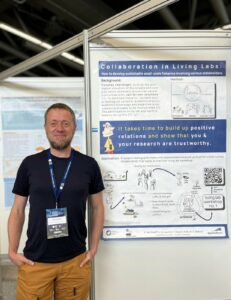
Josefine Gottschalk, scientist in our research mission and in the SpaCeParti project, will speak about her commitment to oceans at the kick-off event for the “Week of Civic Engagement” 2023 on 08 September. It was the sea turtles, that much we can reveal here, that led to the invitation. Congratulations, Josefine!
Click here for the live stream of the event!
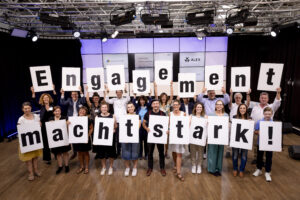
![]()
Another fisheries dialogue was held in Heiligenhafen on 6 September with lively participation. Exciting presentations were given on “Baltic Sea fisheries in climate change” (Fietz, Reßing, Albrecht), “Coastal oxygen minimum zones in the Baltic Sea” (Hepach, Schlundt) and “News on cormorants” (Knoop).
In addition, Oilver Greve and Kai de Graaf from the SpaCeParti living lab Wismar Bay presented news on the pilot training Sea Ranger.
Many thanks for a wonderful exchange and constructive cooperation.
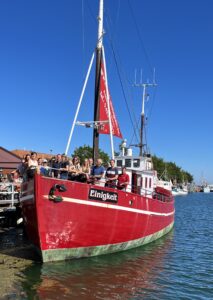
Since December 2021, more than 250 scientists in the DAM research mission Protection and Sustainable Use of Marine Areas, funded by the BMBF with 25 million €, have been investigating the ecological, economic and social impacts of use and pollution in the German marine areas in two pilot projects and five research networks.
From 30.08. – 01.09.2023, the Mission Mid-Term Conference took place at the Christian-Albrechts-Universität zu Kiel. In addition to the scientific exchange, representatives from politics and industry, associations and communities from northern Germany were informed about the results of the mission so far.
Furthermore, the event was a platform for an interactive exchange with stakeholders and scientists on the topic of “Protection and sustainable use of marine spaces”. For this purpose, workshops were held to integrate the different needs and perspectives of the participants. The following topics were selected for this purpose:
1. impacts of climate change on marine ecosystems & coastal protection
2. multi-use – perspectives in the context of the North Sea as Europe’s Green Power Plant
3. impact of pollution & munitions on marine ecosystems
4. conservation of marine biodiversity and importance of protected areas
5. future of fisheries
6. methods for monitoring and assessment
We are delighted that the MTC has been recognised as both a “European Maritime Day 2023 in my country” – and as a UN Ocean Decade activity.
We would like to thank all participants for a successful and informative conference.
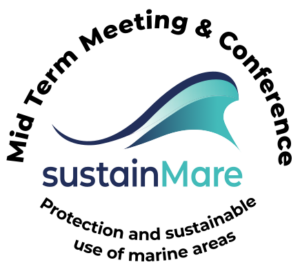
From 30 August to 1 September 2023, the Mid Term Conference of the research mission “Protection and Sustainable Use of Marine Areas ─ sustainMare” of the German Alliance for Marine Research (DAM) took place at Christian-Albrechts-Universität zu Kiel.
About the research mission sustainMare
In the research mission “Protection and Sustainable Use of Marine Areas” – in short: sustainMare – of the German Alliance for Marine Research (DAM), around 250 researchers in two pilot and five collaborative projects are investigating how sustainable use can be ensured in the future while at the same time protecting the oceans. Through inter- and transdisciplinary research approaches, knowledge about multiple stressors and the effects of climate change on the marine ecosystem is to be increased and concrete recommendations for action for and with various target groups are to be developed with the help of future scenarios. SustainMare is coordinated at the Helmholtz Centre Hereon. Since December 2021, sustainMare has been funded by the Federal Ministry of Education and Research (BMBF) with 25 million euros in its first three-year phase. Together with its 22 member institutions, DAM is developing solution-oriented knowledge and options for action for a sustainable approach to coasts, seas and the ocean.
About the researchmission sustainMare: https://www.sustainmare.de/
About German Alliance Ocean Reserach: https://www.allianz-meeresforschung.de/
About „European Maritime Day in my Country“: https://maritime-day.ec.europa.eu/my-country_en
A lecture was held for the public at the CAU on 30 August, which was very well attended with an almost full lecture hall:
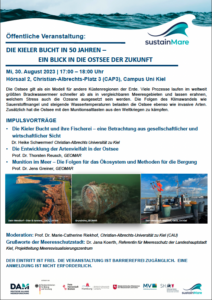
Dr. Felix Mittermayer and Dr. Steffen Funk gave insights into current fisheries research of GEOMAR and the University of Hamburg on herring and cod in the Baltic Sea at the 9th Dialogue on Small-scale Coastal Fisheries, organised within the framework of the balt_ADAPT project at the Fisheries Office in Neustadt in Holstein.
Dr. Mittermayer showed how GEOMAR contributed to the development of the genetic stock separation of the two Baltic cod stocks (i.e. western and eastern Baltic cod) in the past years. Furthermore, he gave exciting insights into the change in the diet of the eastern Baltic cod, which is also significantly associated with the change in environmental factors, and which was revealed with the help of isotope analyses. In addition, there were current insights into ongoing research on the western spring spawning herring, whereby analyses of a catch diary of the Kiel Canal fisherman impressively showed that the herring now appear earlier on their spawning dates than in the past, which is associated with mild winters in the context of climate change.
Dr Funk gave insights into research on the ecology of the western Baltic cod. In particular, the importance of the ecological knowledge of fishermen was illustrated, which helped to decipher spatio-temporal distribution patterns of cod in recent studies and also revealed weaknesses of scientific monitoring surveys (due to limited spatial coverage). Recent studies on cod nutrition and growth were also shown. In the modelling, prolonged midsummer phases could be identified as critical phases for the western Baltic cod, which can lead to overall reduced growth, poorer condition and ultimately also to reduced reproductive potential.
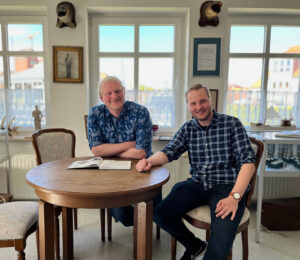
The Meyer fishing family and CeOS employee Heike Schwermer report on the situation in the Baltic Sea and coastal fishing.
Participants of the SpaCeParti Reallabor Stein-Wendtorf were interviewed for the NDR DAS! Magazine and report on the cooperation between fisheries and research.
The report is in german language.
Here you can reach the report via NDR Mediathek.
Current results from the research mission sustainMare of the German Alliance for Marine Research.
Oceans and coastal areas are increasingly being used. The so-called “Blue Economy” is one of the fastest growing economic sectors worldwide. At the same time, they are particularly exposed to climate change and have a special role to play in combating climate change. To protect the natural environment and its resources from these increasing pressures, at least 10% of marine areas should be protected. In the EU, more than 12% of marine areas have been designated as protected areas, which means that the EU has complied with international agreements, but precise protection measures have only been laid down for a fraction of these areas.
The effects of increasing use of the oceans and the development of protection concepts and options for action for the sustainable use of marine resources are being researched by the German Alliance for Marine Research’s research mission “sustainMare: Protection and Sustainable Use of Marine Areas”.
In our lecture series, we report from the mission on the background and results of our work. Individual aspects will be explained in self-contained lectures in a professionally competent and generally understandable way. A broad spectrum of topics will be addressed, from the energy transition in the North Sea and Baltic Sea to climate change on the coast and the protection of biodiversity to the dangers posed by munitions waste in the sea.
The sustainMare research mission is funded by the Federal Ministry of Education and Research (BMBF) under the funding code 03F0911A. Further information can be found on the website www.sustainMare.de.
On 21.02.2023 Anna Kassautzki (MdB, SPD) and Delara Burchardt (MEP, SPD), met with CeOS staff members Heike Schwermer, Marie-Catherine Riekhof, Christian Wagner-Ahlfs, Kai de Graaf, Rüdiger, to discuss current issues of sustainable and future Baltic Sea fisheries.
The projects balt_ADAPT and SpaCeParti were presented with explicit reference to transdisciplinary working with small-scale coastal fisheries, nature and environmental protection and tourism.
Furthermore, a look into the future was ventured and the bio-economic modelling of the fish stocks Western cod (Gadus morhua) and herring (Clupea harengus) was presented and discussed.
Important and exciting information was exchanged on both sides in a positive and constructive atmosphere.
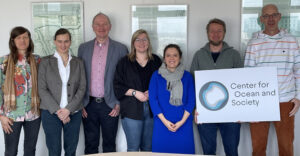
Heike Schwermer, Marie-Catherine Riekhof, Christian Wagner-Ahlfs, Anna Kassautzki, Delara Burchardt, Kai de Graaf, Rüdiger Voss
In the Stein-Wendtorf living lab, a first comprehensive stakeholder workshop took place, where a joint pilot project was agreed upon.
In 2022, we conducted interviews and research with stakeholders on site and also drafted initial project ideas for the living lab with a focus group. The aim of the focus group was to develop a project idea that contributes to local fisheries and connects local stakeholders. We were able to present these ideas to a larger group of stakeholders on 08.02.23. The project idea of an information path on the topic of coastal culture met with positive approval throughout, so that we will now start with the first project in the living lab and were able to inspire a colourful mixed stakeholder community. Further conception and implementation meetings will follow in the coming months.
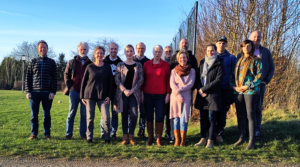
The publication contributes to a common understanding of the term “transdisciplinarity” among scientists and stakeholders in marine research.
Transdisciplinary research is a growing field in academia, yet, there still is no uniform definition. The interdisciplinary team of the Center for Ocean and Society addresses this in the new publication “The multifaceted picture of transdisciplinarity in marine research”.
Often, transdisciplinary research is contrasted to disciplinary, multi- and interdisciplinary research: while disciplinary research includes only one discipline, multi- and inter-disciplinary research includes several disciplines. However, the key difference of interdisciplinary research is the collaboration of all disciplines to achieve the objectives set within a particular project. Additionally, transdisciplinary research involves stakeholders from various backgrounds.
Grünhagen, C., Schwermer, H., Wagner-Ahlfs, C., Voss, R., Gross, F., & Riekhof, M.-C. (2023). The multifaceted picture of transdisciplinarity in marine research. In S., Gomez Mestres & V., Köpsel, Transdisciplinary Marine Research – Bridging Science and Society (Volume 1). Abingdon: Routledge.

Important & exciting exchange with the Federal Agency for Nature Conservation (BfN) on the island of Vilm. The focus was on issues of ecological, social and economic content of current and future marine nature conservation for the North Sea and Baltic Sea.
Scientists of the sustainMare mission met representatives of the Federal Agency for Nature Conservation on the island of Vilm on 24 January 2023. The aim of the workshop was to discuss issues in the field of marine nature conservation of all 7 projects, to identify knowledge and data gaps and to discuss future joint cooperation. Special focus was put on the topics of fisheries, governance and monitoring.
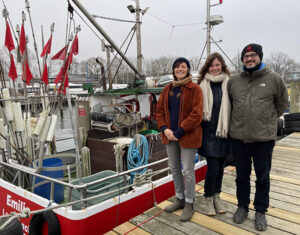
The sixth Friends of the Earth Germany (BUND) Research Award for Sustainable Development honours a marine topic for the first time ever.
Our SpaCeParti colleague Josefine Gottschalk, MSP expert from the Leibniz Institute of Ecological Urban and Regional Development Dresden (IOER), received this years Friends of the Earth Germany Research Award for “Research on Sustainable Development” for her Master’s thesis entitled “Scratching Below Surface – Is the Maritime Spatial Planning of the European Union ready for Adequate Marine Conservation?”. In her thesis, she addresses the insufficient integration of ecological aspects into marine spatial planning. For this purpose, she examined the current marine spatial plan of the German Exclusive Economic Zone on structural (biodiversity) and functional (ecosystem functioning) components of the marine environment.
With her thesis, Friends of the Earth Germany awarded research on a marine topic for the first time. The award recognizes outstanding achievements that contribute to a stronger orientation of the science system towards the major societal challenges.
It underlines the importance of the sea as a rapidly changing natural environment due to human interference as well as the herewith connected social relevance of sustainable development at sea.
She was also awarded the TU Berlin’s Carla von Simson-Prize for her work, which was awarded 1st place.
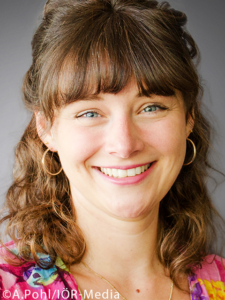
The cod stock in the western Baltic Sea has collapsed – directed fishing for this stock is prohibited. The search for sustainable solutions, such as the reallabor approach, has been reignited.
A structural change in fisheries is in full swing – fishing companies are disappearing, fisheries cooperatives have to close, entire coastal regions are changing.
This is because the stock of western Baltic cod has collapsed, which is why directed fishing is currently banned.
While discussions about possible reasons have been going on for many years, the search for possible solutions has been reignited. The SpaCeParti project, coordinated by the Center for Ocean and Society, is testing sustainable use strategies for the conservation of coastal fisheries in the western Baltic Sea in a so-called real-lab approach. Stakeholders from the groups of coastal fisheries, nature and environmental protection, tourism and renewable energies are actively participating in this research project.
More informations here:
Hübbe, Morten. 2022. Küstenfischerei. Der Dorsch verschwindet. Katapult MV.
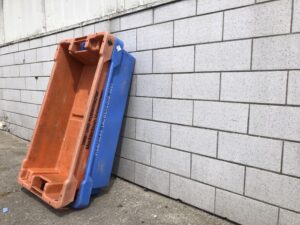
Staff members of project SpaCeParti are responding to the call for contributions to the special volume “The Future of Fisheries in Germany”.
Prof. Dr. Arlinghaus (editor of the Journal of Fisheries) and Prof. Dr. Möllmann (among others involved in the SpaCeParti project) have initiated the special volume in order to provide a discussion forum. This is above all for questions relevant to practice in marine and inland fisheries, angling and aquaculture, in order to present proposed solutions for the future from various perspectives of research, professional policy and social interest representation.
The call for participation goes explicitly to the community of all interested parties from fisheries, research, administration, politics and non-governmental organisations in order to stimulate a constructive discourse.
In the SpaCeParti consortium, we are happy to answer this call, to actively participate and to contribute our knowledge.
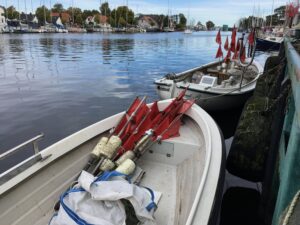
Linking of different research contents within the SpaCeParti project on small-scale coastal fisheries and their connection with knowledge contents of stakeholders.
Interdisciplinary research thrives on mutual exchange with each other and between disciplines. Therefore, the consortium of the SpaCeParti project went to the Klosterhotel Damme for five days. In a pleasant atmosphere, results were presented, contents discussed and agreements and new ideas for the further procedure were developed. This exchange was felt to be very productive by all sides and has laid a foundation for further work in the individual work packages.
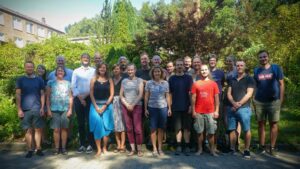
Positive experiences and encounters in the exchange with fishermen and stakeholders around small-scale coastal fishing on Rügen and the Greifswalder Bodden region.
In order to find a location for the second living lab in Mecklenburg-Western Pomerania, members of work package 1 “Living Laboratories” carried out an excursion lasting several days to the greater area of Rügen and Greifswalder Bodden. The aim was to get into personal contact with local fishermen and fishing cooperatives, as well as with institutions related to fishing (e.g. museums, artists and tourism providers). We were able to get a broad overview of the current situation of the fishermen and to collect information and data. We are happy to have met many people from the sector who were willing to discuss herring and cod with us, as well as the current challenges for fisheries.
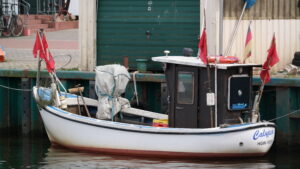
Internal project contents and goals were concretised in dialogue with each other.
In June 2022, we were able to meet for the first time with the project consortium for two days in person at Kiel University (Christian-Albrechts-Universität zu Kiel). This facilitated a lively and productive exchange with each other. We informed each other about the status of the work packages, concretised objectives and built up an interdisciplinary infrastructure. It became clear that there is a lot of knowledge from various research areas in this project, as well as a strong motivation to support small-scale coastal fisheries.
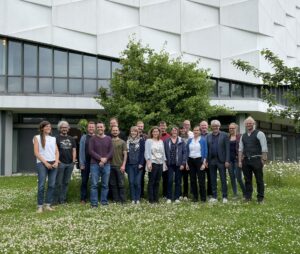
Establishment of the living lab (form of future workshop) in Stein-Wendtorf to find and try out solutions to problems together with fisheries stakeholders.
The core of the project will be two living labs. Living labs are localised places where researchers and stakeholders work together to find solutions to problems, test them on site in experiments and, if successful, implement them in other places. In this participatory way of working, there is an exchange at eye level and a transfer of knowledge between stakeholders and researchers.
Participants in work package 1 “Living Laboratories” met for the first time on 23.05.2022 with stakeholders from the museum harbour in Stein-Wendtorf to discuss initial ideas and plan future cooperation. In the course of this exchange, the current situation of the fishermen on site was also discussed.
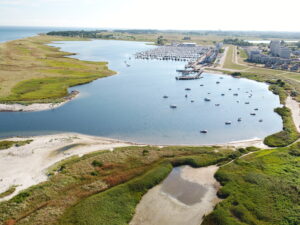
Interdisciplinary science team starts collaboration to support small-scale coastal fisheries of the Western Baltic Sea on the way to a sustainable future.
The kick-off meeting for the SpaCeParti project took place at the end of February 2022. For the first time, the project consortium met with the scientific advisory board, representatives of the German Alliance for Marine Research (DAM) and the Project Management Organisation Jülich (PtJ) to introduce themselves to each other and make initial arrangements.
Information was exchanged and the possibilities and goals of the project, namely to shape a sustainable future for small-scale coastal fisheries in the western Baltic Sea, were discussed. Furthermore, a first exchange took place in the work packages.
Due to the Corona situation, this first meeting took place virtually.

